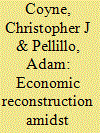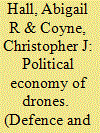| Srl | Item |
| 1 |
ID:
110009


|
|
|
|
|
| Publication |
2011.
|
| Summary/Abstract |
Economic reconstruction typically takes place after the end of war. Yet recently, economic reconstruction has been viewed as a means to 'win hearts and minds' during ongoing conflict. Drawing on a variety of reconstruction experiences from Afghanistan and Iraq, we identify four 'reconstruction traps' that result from the incentives and constraints faced by actors involved in economic reconstruction during ongoing conflict. These traps include: 1. the credible commitment trap, 2. the knowledge trap, 3. the political economy trap, and 4. the bureaucracy trap. Avoiding these traps is critical for successful economic reconstruction; and we discuss potential strategies for doing so.
|
|
|
|
|
|
|
|
|
|
|
|
|
|
|
|
| 2 |
ID:
131326


|
|
|
|
|
| Publication |
2014.
|
| Summary/Abstract |
This paper provides a political economy analysis of the evolution of unmanned aerial vehicles (UAV), or 'drones' in the USA. Focus is placed on the interplay between the polity and private economic influences, and their impact on the trajectory of political, economic, and military outcomes. We identify the initial formation of the drone industry, trace how the initial relationships between the military and the private sector expanded over time, and discuss present relationships. Understanding the historical evolution of UAV technology, as well as the major players in the industry today, is important for ongoing policy debates regarding the use of drones both domestically and internationally.
|
|
|
|
|
|
|
|
|
|
|
|
|
|
|
|
| 3 |
ID:
074655


|
|
|
|
|
| Publication |
2006.
|
| Summary/Abstract |
Attempts to reconstruct weak and failed countries suffer from a nirvana fallacy. Where central governments are absent or dysfunctional, it is assumed that reconstruction efforts by foreign governments generate a preferable outcome. This assumption overlooks (1) the possibility that foreign government interventions can fail, (2) the possibility that reconstruction efforts can do more harm than good, and (3) the possibility that indigenous governance mechanisms may evolve that are more effective than those imposed by military occupiers. It is argued that reconstruction efforts focus on resolving the meta-level game of creating self-sustaining liberal democratic institutions while neglecting the nested games embedded within the general meta-game. An analysis of Somalia, a prototypical failed state, is provided to illuminate these claims. While Somalia lacks a central government, the private sector has developed coping mechanisms to fill the void. These mechanisms have proven to be more effective in generating widespread order than attempts by foreign occupiers to impose a self-sustaining liberal state.
|
|
|
|
|
|
|
|
|
|
|
|
|
|
|
|